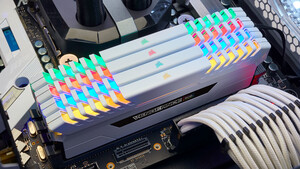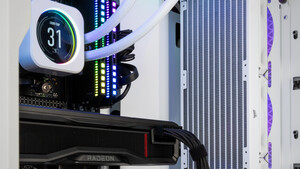Gerstenmalz
Newbie
- Registriert
- März 2018
- Beiträge
- 7
Hallo,
ich habe seit einiger Zeit Probleme mit der Audiowiedergabe und kurzen Standbildern bei Computerspielen , mal mehr mal weniger.
Ich habe schon alles mögliche probiert. Neue Treiber installiert, BIOS update und auch eine neue HDD.
Dann habe ich mit LatnecyMon einen Test durchgeführt der mir aber nicht weiter hilft.
Evtl. kennst sich ja hier damit jemand aus.
________________________________________________________________________________________________________
CONCLUSION
_________________________________________________________________________________________________________
Your system appears to be having trouble handling real-time audio and other tasks. You are likely to experience buffer underruns appearing as drop outs, clicks or pops. One problem may be related to power management, disable CPU throttling settings in Control Panel and BIOS setup. Check for BIOS updates.
LatencyMon has been analyzing your system for 0:24:42 (h:mm:ss) on all processors.
_________________________________________________________________________________________________________
SYSTEM INFORMATION
_________________________________________________________________________________________________________
Computer name: BVB-PC
OS version: Windows 7 Service Pack 1, 6.1, build: 7601 (x64)
Hardware: ASRock, H87 Pro4
CPU: GenuineIntel Intel(R) Core(TM) i5-4570 CPU @ 3.20GHz
Logical processors: 4
Processor groups: 1
RAM: 8111 MB total
_________________________________________________________________________________________________________
CPU SPEED
_________________________________________________________________________________________________________
Reported CPU speed: 3199 MHz
Measured CPU speed: 1 MHz (approx.)
Note: reported execution times may be calculated based on a fixed reported CPU speed. Disable variable speed settings like Intel Speed Step and AMD Cool N Quiet in the BIOS setup for more accurate results.
WARNING: the CPU speed that was measured is only a fraction of the CPU speed reported. Your CPUs may be throttled back due to variable speed settings and thermal issues. It is suggested that you run a utility which reports your actual CPU frequency and temperature.
_________________________________________________________________________________________________________
MEASURED INTERRUPT TO USER PROCESS LATENCIES
_________________________________________________________________________________________________________
The interrupt to process latency reflects the measured interval that a usermode process needed to respond to a hardware request from the moment the interrupt service routine started execution. This includes the scheduling and execution of a DPC routine, the signaling of an event and the waking up of a usermode thread from an idle wait state in response to that event.
Highest measured interrupt to process latency (µs): 7414,864298
Average measured interrupt to process latency (µs): 6,057762
Highest measured interrupt to DPC latency (µs): 3063,572899
Average measured interrupt to DPC latency (µs): 3,962094
_________________________________________________________________________________________________________
REPORTED ISRs
_________________________________________________________________________________________________________
Interrupt service routines are routines installed by the OS and device drivers that execute in response to a hardware interrupt signal.
Highest ISR routine execution time (µs): 34,595811
Driver with highest ISR routine execution time: ACPI.sys - ACPI-Treiber für NT, Microsoft Corporation
Highest reported total ISR routine time (%): 0,021324
Driver with highest ISR total time: hal.dll - Hardware Abstraction Layer DLL, Microsoft Corporation
Total time spent in ISRs (%) 0,021482
ISR count (execution time <250 µs): 1401803
ISR count (execution time 250-500 µs): 0
ISR count (execution time 500-999 µs): 0
ISR count (execution time 1000-1999 µs): 0
ISR count (execution time 2000-3999 µs): 0
ISR count (execution time >=4000 µs): 0
_________________________________________________________________________________________________________
REPORTED DPCs
_________________________________________________________________________________________________________
DPC routines are part of the interrupt servicing dispatch mechanism and disable the possibility for a process to utilize the CPU while it is interrupted until the DPC has finished execution.
Highest DPC routine execution time (µs): 660,956549
Driver with highest DPC routine execution time: ndis.sys - NDIS 6.20-Treiber, Microsoft Corporation
Highest reported total DPC routine time (%): 0,549124
Driver with highest DPC total execution time: cmudaxp.sys - C-Media Audio WDM Driver, C-Media Inc
Total time spent in DPCs (%) 0,817587
DPC count (execution time <250 µs): 10242388
DPC count (execution time 250-500 µs): 0
DPC count (execution time 500-999 µs): 58
DPC count (execution time 1000-1999 µs): 0
DPC count (execution time 2000-3999 µs): 0
DPC count (execution time >=4000 µs): 0
_________________________________________________________________________________________________________
REPORTED HARD PAGEFAULTS
_________________________________________________________________________________________________________
Hard pagefaults are events that get triggered by making use of virtual memory that is not resident in RAM but backed by a memory mapped file on disk. The process of resolving the hard pagefault requires reading in the memory from disk while the process is interrupted and blocked from execution.
NOTE: some processes were hit by hard pagefaults. If these were programs producing audio, they are likely to interrupt the audio stream resulting in dropouts, clicks and pops. Check the Processes tab to see which programs were hit.
Process with highest pagefault count: firefox.exe
Total number of hard pagefaults 8849
Hard pagefault count of hardest hit process: 3461
Highest hard pagefault resolution time (µs): 1481455,468271
Total time spent in hard pagefaults (%): 1,374393
Number of processes hit: 30
_________________________________________________________________________________________________________
PER CPU DATA
_________________________________________________________________________________________________________
CPU 0 Interrupt cycle time (s): 92,500766
CPU 0 ISR highest execution time (µs): 34,595811
CPU 0 ISR total execution time (s): 1,273909
CPU 0 ISR count: 1401803
CPU 0 DPC highest execution time (µs): 660,956549
CPU 0 DPC total execution time (s): 47,341401
CPU 0 DPC count: 10002474
_________________________________________________________________________________________________________
CPU 1 Interrupt cycle time (s): 27,665431
CPU 1 ISR highest execution time (µs): 0,0
CPU 1 ISR total execution time (s): 0,0
CPU 1 ISR count: 0
CPU 1 DPC highest execution time (µs): 237,081588
CPU 1 DPC total execution time (s): 0,350059
CPU 1 DPC count: 63829
_________________________________________________________________________________________________________
CPU 2 Interrupt cycle time (s): 25,681057
CPU 2 ISR highest execution time (µs): 0,0
CPU 2 ISR total execution time (s): 0,0
CPU 2 ISR count: 0
CPU 2 DPC highest execution time (µs): 537,853079
CPU 2 DPC total execution time (s): 0,326312
CPU 2 DPC count: 55185
_________________________________________________________________________________________________________
CPU 3 Interrupt cycle time (s): 12,293612
CPU 3 ISR highest execution time (µs): 0,0
CPU 3 ISR total execution time (s): 0,0
CPU 3 ISR count: 0
CPU 3 DPC highest execution time (µs): 512,090028
CPU 3 DPC total execution time (s): 0,465936
CPU 3 DPC count: 120958
_________________________________________________________________________________________________________
ich habe seit einiger Zeit Probleme mit der Audiowiedergabe und kurzen Standbildern bei Computerspielen , mal mehr mal weniger.
Ich habe schon alles mögliche probiert. Neue Treiber installiert, BIOS update und auch eine neue HDD.
Dann habe ich mit LatnecyMon einen Test durchgeführt der mir aber nicht weiter hilft.
Evtl. kennst sich ja hier damit jemand aus.
________________________________________________________________________________________________________
CONCLUSION
_________________________________________________________________________________________________________
Your system appears to be having trouble handling real-time audio and other tasks. You are likely to experience buffer underruns appearing as drop outs, clicks or pops. One problem may be related to power management, disable CPU throttling settings in Control Panel and BIOS setup. Check for BIOS updates.
LatencyMon has been analyzing your system for 0:24:42 (h:mm:ss) on all processors.
_________________________________________________________________________________________________________
SYSTEM INFORMATION
_________________________________________________________________________________________________________
Computer name: BVB-PC
OS version: Windows 7 Service Pack 1, 6.1, build: 7601 (x64)
Hardware: ASRock, H87 Pro4
CPU: GenuineIntel Intel(R) Core(TM) i5-4570 CPU @ 3.20GHz
Logical processors: 4
Processor groups: 1
RAM: 8111 MB total
_________________________________________________________________________________________________________
CPU SPEED
_________________________________________________________________________________________________________
Reported CPU speed: 3199 MHz
Measured CPU speed: 1 MHz (approx.)
Note: reported execution times may be calculated based on a fixed reported CPU speed. Disable variable speed settings like Intel Speed Step and AMD Cool N Quiet in the BIOS setup for more accurate results.
WARNING: the CPU speed that was measured is only a fraction of the CPU speed reported. Your CPUs may be throttled back due to variable speed settings and thermal issues. It is suggested that you run a utility which reports your actual CPU frequency and temperature.
_________________________________________________________________________________________________________
MEASURED INTERRUPT TO USER PROCESS LATENCIES
_________________________________________________________________________________________________________
The interrupt to process latency reflects the measured interval that a usermode process needed to respond to a hardware request from the moment the interrupt service routine started execution. This includes the scheduling and execution of a DPC routine, the signaling of an event and the waking up of a usermode thread from an idle wait state in response to that event.
Highest measured interrupt to process latency (µs): 7414,864298
Average measured interrupt to process latency (µs): 6,057762
Highest measured interrupt to DPC latency (µs): 3063,572899
Average measured interrupt to DPC latency (µs): 3,962094
_________________________________________________________________________________________________________
REPORTED ISRs
_________________________________________________________________________________________________________
Interrupt service routines are routines installed by the OS and device drivers that execute in response to a hardware interrupt signal.
Highest ISR routine execution time (µs): 34,595811
Driver with highest ISR routine execution time: ACPI.sys - ACPI-Treiber für NT, Microsoft Corporation
Highest reported total ISR routine time (%): 0,021324
Driver with highest ISR total time: hal.dll - Hardware Abstraction Layer DLL, Microsoft Corporation
Total time spent in ISRs (%) 0,021482
ISR count (execution time <250 µs): 1401803
ISR count (execution time 250-500 µs): 0
ISR count (execution time 500-999 µs): 0
ISR count (execution time 1000-1999 µs): 0
ISR count (execution time 2000-3999 µs): 0
ISR count (execution time >=4000 µs): 0
_________________________________________________________________________________________________________
REPORTED DPCs
_________________________________________________________________________________________________________
DPC routines are part of the interrupt servicing dispatch mechanism and disable the possibility for a process to utilize the CPU while it is interrupted until the DPC has finished execution.
Highest DPC routine execution time (µs): 660,956549
Driver with highest DPC routine execution time: ndis.sys - NDIS 6.20-Treiber, Microsoft Corporation
Highest reported total DPC routine time (%): 0,549124
Driver with highest DPC total execution time: cmudaxp.sys - C-Media Audio WDM Driver, C-Media Inc
Total time spent in DPCs (%) 0,817587
DPC count (execution time <250 µs): 10242388
DPC count (execution time 250-500 µs): 0
DPC count (execution time 500-999 µs): 58
DPC count (execution time 1000-1999 µs): 0
DPC count (execution time 2000-3999 µs): 0
DPC count (execution time >=4000 µs): 0
_________________________________________________________________________________________________________
REPORTED HARD PAGEFAULTS
_________________________________________________________________________________________________________
Hard pagefaults are events that get triggered by making use of virtual memory that is not resident in RAM but backed by a memory mapped file on disk. The process of resolving the hard pagefault requires reading in the memory from disk while the process is interrupted and blocked from execution.
NOTE: some processes were hit by hard pagefaults. If these were programs producing audio, they are likely to interrupt the audio stream resulting in dropouts, clicks and pops. Check the Processes tab to see which programs were hit.
Process with highest pagefault count: firefox.exe
Total number of hard pagefaults 8849
Hard pagefault count of hardest hit process: 3461
Highest hard pagefault resolution time (µs): 1481455,468271
Total time spent in hard pagefaults (%): 1,374393
Number of processes hit: 30
_________________________________________________________________________________________________________
PER CPU DATA
_________________________________________________________________________________________________________
CPU 0 Interrupt cycle time (s): 92,500766
CPU 0 ISR highest execution time (µs): 34,595811
CPU 0 ISR total execution time (s): 1,273909
CPU 0 ISR count: 1401803
CPU 0 DPC highest execution time (µs): 660,956549
CPU 0 DPC total execution time (s): 47,341401
CPU 0 DPC count: 10002474
_________________________________________________________________________________________________________
CPU 1 Interrupt cycle time (s): 27,665431
CPU 1 ISR highest execution time (µs): 0,0
CPU 1 ISR total execution time (s): 0,0
CPU 1 ISR count: 0
CPU 1 DPC highest execution time (µs): 237,081588
CPU 1 DPC total execution time (s): 0,350059
CPU 1 DPC count: 63829
_________________________________________________________________________________________________________
CPU 2 Interrupt cycle time (s): 25,681057
CPU 2 ISR highest execution time (µs): 0,0
CPU 2 ISR total execution time (s): 0,0
CPU 2 ISR count: 0
CPU 2 DPC highest execution time (µs): 537,853079
CPU 2 DPC total execution time (s): 0,326312
CPU 2 DPC count: 55185
_________________________________________________________________________________________________________
CPU 3 Interrupt cycle time (s): 12,293612
CPU 3 ISR highest execution time (µs): 0,0
CPU 3 ISR total execution time (s): 0,0
CPU 3 ISR count: 0
CPU 3 DPC highest execution time (µs): 512,090028
CPU 3 DPC total execution time (s): 0,465936
CPU 3 DPC count: 120958
_________________________________________________________________________________________________________




